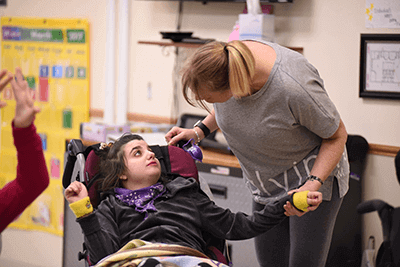DDD Supported Employment Services

Services assist individuals with developmental disabilities achieve employment
Individuals who are on the NJ Division of Developmental Disabilities (DDD) Supports Program or Community Care Program are eligible to receive Supported Employment Services. These services can be provided on an individual basis or in a group.
- Individual Employment Support services would assist an individual in obtaining and sustaining a job in a competitive, customized, or self employment situation. A job in the community must take place within the general workforce and compensation must be at minimum wage or higher and no less that the wages customarily paid for that position. Benefits must also be the same as a non-disabled worker would receive. This service could include activities such as
- training and instruction needed to perform the tasks related to the job
- job coaching to help an individual perform their tasks to the specification of the employer and helps the individual interact with other workers
- job development to find the right job for the abilities and interests of the individual
- travel training to help an individual learn to get to and from their employment location
- training that may not be related to job skills but will contribute to employment success
- Small Group Support services are provided to individuals in groups of two to eight in community settings. The services must promote integration and interaction of individuals with people without disabilities. This service could include activities such as:
- working as part of a mobile crew that works in different community locations
- skill development while working as part of a group
- job development to find the right job for the abilities and interests of the individual
There are three phases to Supported Employment Services: Pre-Placement, Intensive Job Coaching and Long-Term Follow Along (LTFA). Some individuals may not require all three phases.
The Pre-Placement Phase helps the individuals decide on a career path and identify possible jobs or competitive employment options in their community. Some of the activities that may take place are:
- Assessments – In order to identify strengths, skills, support needs, and interests or preferences, an individual may participate in job sampling, trial work experiences, or vocational assessments.
- Job Development – Abilities and interests information is used to identify possible jobs and connect potential employees with potential employers.
- Development of job seeking skills – Individuals are assisted with developing interview skills, preparing a resume, completing applications, etc.
- Addressing of concerns and barriers –Individuals receive critical information about things like maintaining benefits, accessing work incentives, and finding transportation options.
- Outreach to businesses – The service provider works with local businesses to identify jobs, arrange employment opportunities and trial work experiences, and works with employers to develop options suited to the needs of particular employment seekers.
The Intensive Job Coaching Phase occurs once the individual has become employed. Some of the activities that may take place are:
- Orientation – The employee is introduced to and familiarized with his/her workplace, rules, and job requirements.
- Job coaching –A job coach assists the individual with learning their job and meeting the standards of the employer.
- Training – Training is provided to the individual in order for them to gain the skills necessary to complete required tasks.
- Accommodations and strategies – Adjustment to the worksite or tasks are devised to assist the individual in successfully meeting their job requirements. Coworkers or supervisors are assisted with providing natural supports.
- Travel training – individuals are assisted with finding and utilizing transportation options.
- Fading – As the individual becomes more proficient at their job, the job coach will decrease the amount of support that they provide.
The Long-Term Follow Along Phase occurs once the individual is stable in their job and is working independently. Some of the activities that may take place are:
- Ongoing support – individuals are monitored to assure that stability in a job continues.
- Intervention – If the duties or tasks required of the individuals changes, they are supported in adapting to those changes.
- Personnel changes – If an individual gets a new boss, they are assisted with meeting the standards of their new supervisor.
- Issues and Concerns – Individuals experiencing problems with or questions about their employment are supported in finding answers.
- Career Planning – Individuals are supported in pursuing promotions, wage increases, and new job opportunities.
Individuals who are eligible to receive employment supports through the Division of Vocational Rehabilitation Services (DVRS) or through the Commission for the Blind and Visually Impaired (CBVI) must pursue that option before accessing Supported Employment Services through DDD.
However, even if an individual is eligible for DVRS or CBVI services, they can still utilize the Long-Term Follow Along component of DDD Supported Employment Services. The individual’s support coordinator must submit a “DVRS or CBVI Determination Form for Individuals Eligible for DDD” (F# Form) in order to document an individual’s eligibility for Supported Employment Services.
Some important things to know:
- Both Individual and Small Group Supported Employment Services are limited to thirty hours per week. Transportation to or from a job is not included.
- If an individual utilizing Long –Term Follow Along services loses or leaves their job, they must reapply to DVRS or CBVI to determine eligibility, even if they were previously declared ineligible, before being eligible to utilize DDD Supported Employment services to find and adjust to a new job. Until eligibility is determined, DDD will provide Supported Employment Services as needed. If the individual is found eligible for DVRS or CBVI services, their funding will switch to those sources, if not, their services will continue to be provided by DDD.
- An individual receiving Individual Supported Employment Services cannot be employed by the provider who is providing that service. An individual receiving Small Group Employment Services can work within the facilities or buildings of their service provider as long as their work does not occur within a program, such as a day program, and they are paid at least minimum wage.
The goal of DDD funded Supported Employment Services is to assure that all individuals with developmental disabilities “can fulfill their employment aspirations and achieve social and economic inclusion through employment opportunities.” DDD believes that “all individuals with developmental disabilities are entitled to the same competitive wages, work conditions, and career development as their co-workers.”
For more details about Supported Employment Services and options for using this service through an individual budget, contact your support coordinator. For more information about Supported Employment Services provided by SCARC, please call 973-383-7442.



